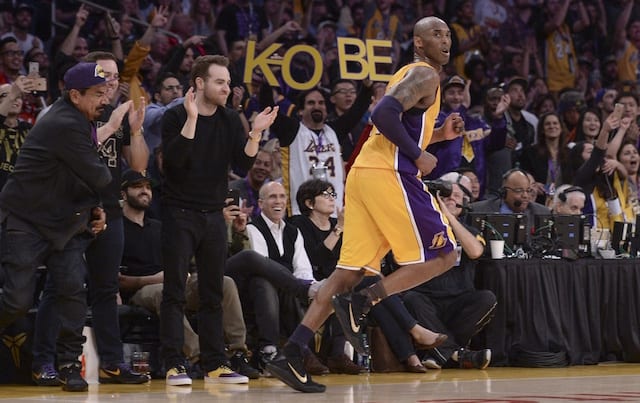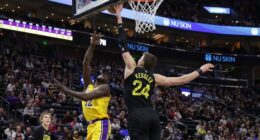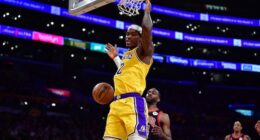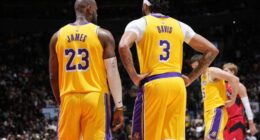After five championships spread across two decades donning the Golden Armor, the Los Angeles Lakers are set to honor Kobe Bryant by retiring his No. 8 and No. 24 jerseys on Monday, Dec. 18, during a ceremony at halftime of a game against the Golden State Warriors.
Lakers Nation spoke with Kobe about his perspective of the media now that he’s heading a media company of his own, how he puts what he’s learned over 20 years in perspective, and the moment he knew he was good enough to have his jersey retired.
Plus, Kobe discussed Kyle Kuzma asking all the right questions during their dinner, and how he’s seen three current Lakers — Julius Randle, Jordan Clarkson, Larry Nance Jr. — evolve since he played alongside them during the end of his own career.
Lastly, Bryant disclosed what actually makes him nervous and how winding up in Oscar buzz with his animated short film “Dear Basketball” has caught him completely off guard.
Serena Winters: Most everyone asks you about what you miss the most about basketball, but what is that you miss the least about the grind?
Kobe Bryant: I don’t miss the unfortunate behavior that a lot of media outlets have to participate in, which is like the down in the weeds type of questions in journalism, like dealing with stuff that seems to be big news topics that people want to hear about, be it LaVar (Ball), be it all this sort of other stuff. I don’t miss that portion of it, you know what I’m saying? Like this person said this, and this person said that, and therefore we can create this issue, and then make it something that people will now read. … I don’t miss that part of it.
SW: Since you’ve been creating your own media company and a platform to tell stories in different ways, how much of what you just said is in the back of your mind when doing so?
KB: Not in my mind at all, I just try to write from a place of truth. … At the core of it all, the writers want to write good stuff, but you can’t control what the mothership wants to put out. And so, I understand that completely and as I write these stories, I want to write from a place of truth, inspire kids, inspire the next generation of athletes, so the more and more we look to expand the media company the more and more we look to find writers that want to come over and write from a place of truth themselves.
SW: Everyone knows you’re getting your jersey retired, or rather both of your jerseys retired, but was there ever a point in your career where you went from having that dream of wanting to see your jersey up there, to knowing that you really were good enough to have your jersey retired?
KB: I’d say, after the season I scored 81, that’s when I would say I thought it’s probably going up there now. That’s when I felt like, okay, my jersey is going to get retired.
SW: Where do you put your last game in perspective with all that you’ve accomplished in your basketball career?
KB: I don’t know if I do (put it in perspective with everything else). … It was a big deal in terms of doing something that hasn’t been done in a long time, but in terms of my personal narrative, it’s something that I’d put on the list, but there are other games and other things that are more foundational and more important because they helped achieve the ultimate goal of winning a championship, like a series that we’ve lost, I’ve learned valuable lessons from, those things are the most important to me. The 81-point game one not so much, because it’s kind of like I’ve put in a summer of work, I called it my blackout summer, where I was making 1,000 shots a day, all of the shots that you’ve seen me do in that game, or that I’ve done thousands and thousands of times before. So from that point it was just about executing things that I’ve done thousands and thousands of times, it’s not a level of shock to me. Other lessons are more important, how to communicate with others, how to understand others, how to get a collection of guys to be the same page. How to put aside self-interest and ego and like all of those things are most important to me in the narrative I’ve created over the past 20 years.
SW: You’ve said before that you do miss carrying that Lakers tradition forward and that Lakers tradition has generally had ‘the guy,’ ‘a superstar,’ and you become that guy with the Lakers, what was the biggest challenge for you of not just becoming that guy, but also having to maintain being that guy?
KB: It’s a challenge to do it, but the challenge is really just how do you get better every day. I’m sure Magic wasn’t thinking about the pressure of carrying the franchise, his mindset was just getting better. The process of having that spirit of wanting to get better every single day evolves to, you end up carrying the franchise because the talent shines through, but that’s the spirit of it, as long as a player has that attitude you’ll be just fine.
SW: I know you chatted with Kyle Kuzma over dinner, who by the way said meeting you has probably been the coolest thing about being a Laker so far, and he said that he just asked you a ton of questions, did any particular question he asked stand out to you?
KB: My memory is always horrible, but all the questions centered around how to get better, how to watch film, how to handle certain coverages, things of that nature. And so his curiosity is all about how to get better, how do I sharpen it, how do I refine it, mentally how do I get better, how do I increase my basketball IQ, all of those questions.
SW: Everyone’s always asking you about Lonzo Ball and Kuzma but you actually spent two years with Julius Randle (although that first year he got hurt) and you spent two years with Jordan Clarkson, anything that stands out with those guys and how they’ve grown over the past few years?
KB: It’s funny, I see Jordan really develop and how to channel his competitiveness out there on the court, being more efficient, understanding his game more, spots he likes and where he wants to get to, he’s more decisive and Julius is, too. Julius seems to be more decisive and he knows his game, knows where he’s comfortable, knows what he likes to do, when he gets the ball, whereas as a young kid coming in, you’re still trying to figure all that out right, so now he’s more decisive with that.
SW: You also played with Larry Nance Jr. in his rookie year, his hard work and basketball IQ is something that’s always stood out to me, what stands out to you about him?
KB: The big thing that I liked about Larry is that when he came in he didn’t really have a whole lot of confidence with his shooting, and so he stayed in the gym late and he worked on it and he worked on it and he worked on it. I was curious to see if he was one of those guys that would work on his game, work on his shot, and then in practice shoot the ball extremely well, before the game shoot the ball extremely well, but as soon as the lights came on, he can’t execute. And, he’s not that guy, he did the work and he went to the game and he was able to execute. His work was able to carry through from practice to the game, which shows me that mentally he had the stability to believe in himself and believe in the work that he’s put in and that was the biggest thing for me.
SW: You haven’t gotten a chance to talk with Lonzo, right?
KB: No.
SW: Transitioning off the basketball court, but at the same time on a very big stage, I remember watching that video of you at The Hollywood Bowl reciting a poem that you wrote, “Dear Basketball,” in front of thousands of people with John Williams scoring in the background, and most people are probably going to think you don’t get nervous, but that is far from the basketball court, were you nervous to do that?
KB: Yeah, because it was something I’ve never practiced before, so for me that’s where the nerves come in, we had rehearsal but that was for like 20 minutes or so, and so that’s where I get nervous, if I have to do something that I haven’t been able to practice hundreds of thousands of times then I can get a little nervous. Standing in front of thousands of people with John Williams, one of the greatest Orchestra players in the world, is not a place that I ever expected to be.
SW: So “Dear Basketball” also happens to be nominated for an Oscar (Academy Awards shortlist inclusion for Best Animated Short Film). You already have the five championships, Kobe, are you just looking for more hardware to add to that mantle or what’s going on here? An Oscar?
KB: I don’t even know. I don’t even know how I got here, to be honest with you. I wanted to work with the people that I grew up admiring, being inspirations in Glen and John, I just wanted to work with them, so all the Oscar buzz, I’m completely shocked to be here, but I’m even more happy for Glen, because Glen’s been in the industry for years. He’s been one of the greatest animators to have ever walked the earth so I am more happy for Glen to hopefully have a moment of getting his just due after years and years and years of creating iconic work.
SW: When people watch “Dear Basketball,” what do you hope they take away from it?
KB: I just hope that whatever they take away from it is something that’s impactful for them. What we try to do is create stories that are pertinent to us, with the understanding that you don’t want to communicate its clear, clear intention to the viewers. We can communicate where we came from and where I came from when writing the piece and Glenn in animating and John in scoring the piece, but ultimately if we are doing our jobs correctly, this person that sees it will pull something personal from the piece and that will be different from person to person.
WANT TO PARTICIPATE IN THE DISCUSSION? CHECK OUT THE NEW LAKERS NATION FORUM CLUB





